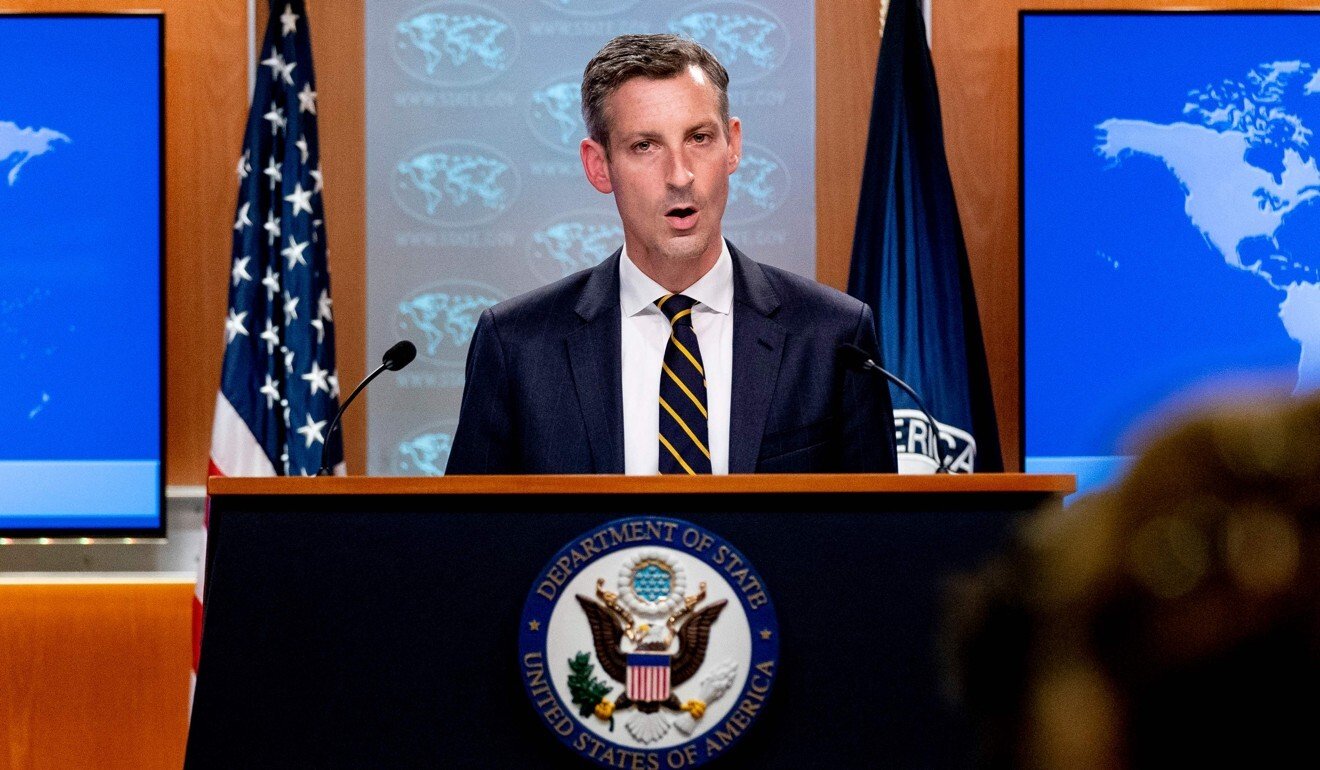
Xi Jinping urges Joe Biden to put US policy on China back on track
- The two presidents hold their first face-to-face meeting, albeit virtually, since Biden entered the White House
- After what both sides call a candid exchange, Xi hints at ‘drastic measures’ over Taiwan, while US ‘opposes unilateral efforts to change the status quo’
Statements released by both sides after the meeting – which lasted more than 3½ hours – described it as a candid exchange, with Beijing saying it had been effective in improving mutual understanding.
“In the next 50 years, the most important thing in international relations is that China and the United States must find the right way to get along,” Xi was quoted as saying. “Anything done by a politician, whether merits or demerits, will be recorded by history.
“It is hoped that Mr President will give full play to his political leadership and push US policy towards China to return to a rational and pragmatic track.”

02:12
Xi-Biden summit previewed by White House press secretary Psaki
“If Taiwan independence separatist forces provoke or even break through the red line, we will have no alternative but to take drastic measures,” he said.
A statement released by the White House said Biden welcomed the opportunity to speak “candidly and straightforwardly” to Xi, and the talks covered a wide range of issues.
In the opening remarks to the meeting – held on Tuesday morning Beijing time , Xi said the two countries should seek peaceful coexistence and mutually beneficial cooperation.
They should handle their own affairs well and share global responsibility, Xi said.
Speaking to reporters, who were present in Washington for the opening remarks, Biden said it was both his and Xi’s responsibility to ensure that ties did not veer into open conflict.
Timeline: Taiwan’s relations with mainland China under Tsai Ing-wen
In turn, Xi said he was pleased to see his “old friend” Biden, a reference that contrasted with remarks hours earlier from White House press secretary Jen Psaki, who said Biden did not view his Chinese counterpart in such terms.
“As the world’s two largest economies and permanent members of the United Nations Security Council, China and the US need to increase communication and cooperation,” Xi said. “We should each run our domestic affairs well and at the same time, share our global responsibility and work together to advance the noble call of world peace and development.
“China and the US should respect each other, coexist in peace and pursue win-win cooperation.
“I stand ready to work with you, Mr President, to build consensus, take active steps and move China-US relations forward in a positive direction.”
Biden said he was looking forward to a “candid and forthright discussion” that would include how to ensure “simple, straightforward competition” between the two countries.
Biden said his agenda for the meeting included human rights, economics and ensuring a free and fair Indo-Pacific.
The two leaders had “always communicated with one another very honestly and candidly”, Biden said, adding: “We never walk away wondering what the other man is thinking.”

Before the meeting, US State Department spokesman Ned Price said that in the current state of affairs, a greater understanding about where each other’s red lines were would constitute a successful discussion.
“It’s not about setting the bar low or setting the bar high,” he said. “It’s about the most important element that there is in our bilateral relationship with [China], and that is very clearly managing that competition, establishing the guardrails.
“If we are able to do that, if we’re able to do that effectively and successfully, there could be no greater deliverable for the United States, for the region and the rest of the world.”
The Chinese embassy in Washington issued a statement shortly before the virtual meeting began that said it would “have great significance not only for bilateral relations but also for international relations”.
“China-US relations have come to a crossroads,” the embassy said. “China hopes that the US side will work with China to explore how our two major countries get along in the new era based on mutual respect and peaceful coexistence, increase dialogue and cooperation, effectively manage differences and properly handle sensitive issues, in a bid to steer the bilateral ties back on the right track of sound and steady development.”
Joe Biden signs US$1 trillion infrastructure bill into law
Biden’s focus on managing the competition with China contrasts with the efforts of previous administrations – at least until that of Donald Trump – to steer the relationship with formal, high-level dialogues that aimed to de-emphasise differences but rarely yielded any gains that the US could trumpet.
“US frustration with underperforming dialogues in the George W. Bush and [Barack] Obama years helped to further disincentivise bilateral negotiations,” Daniel Russel, assistant US secretary of state for Asian and Pacific affairs under Obama, wrote in Foreign Affairs on Sunday.
“Engagement, which had ground to a halt by the end of the Trump administration, has proved difficult to restart.
“Each side is convinced of the superiority of its own system and is focused on the weaknesses of the other’s,” added Russel, now the Asia Society Policy Institute’s vice-president for international security and diplomacy. “Each seems determined to effect a change of behaviour by the other side through deterrence and coercion rather than through incentives or compromise.”

The “continued centralisation of power in Xi Jinping’s hands” through the rare historical resolution that was passed “further underscores the importance of this leader-level engagement”, the official said.
Speaking at the signing of a US$1 trillion infrastructure bill into law on Monday, Biden said again that the legislation was needed to catch up with China on that front – a common refrain throughout months of negotiations with US lawmakers over the bill’s size and scope.
Additional reporting by Reuters



